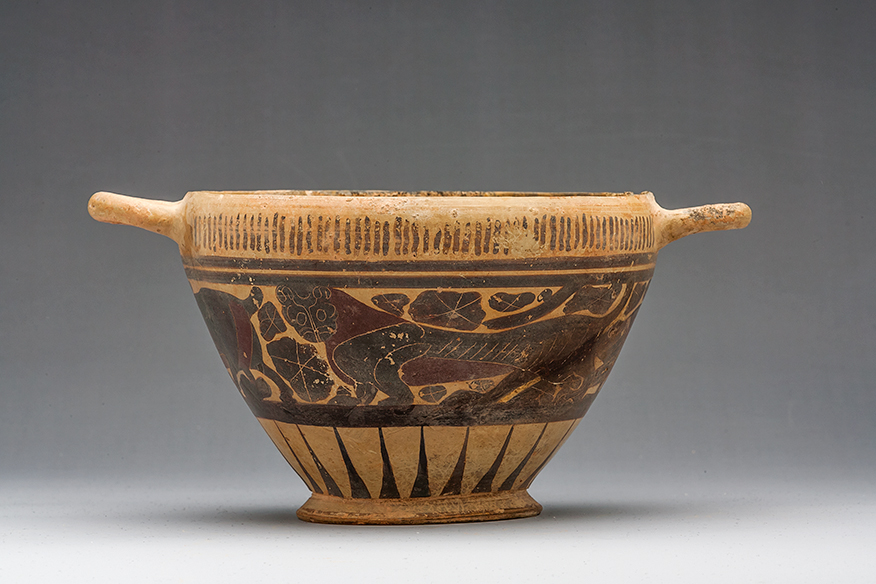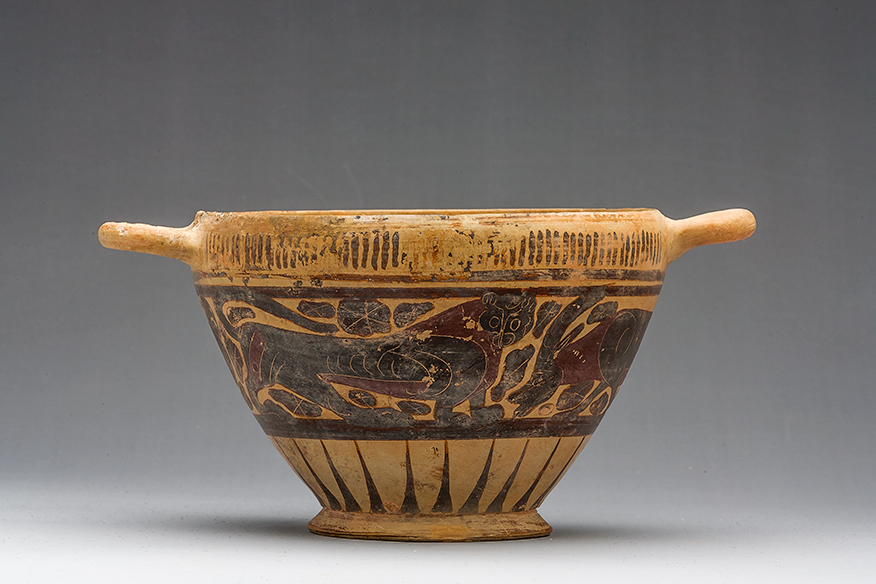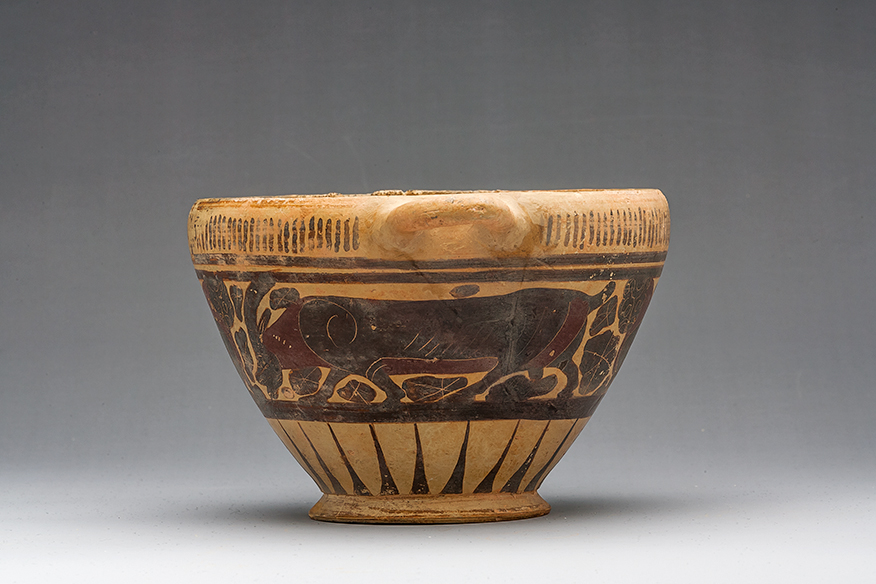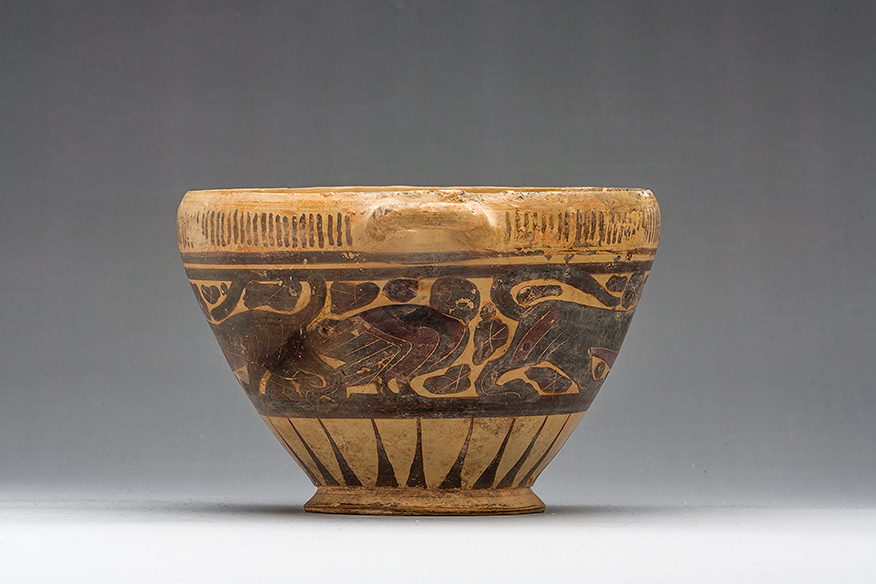Acquisition number: 1971.05
Corinthian Black-Figure Kotyle. Reconstructed from fragments; one handle restored. There is repainting along the joins but the figures are not badly affected. The lip is uneven. Normal Corinthian cream-buff clay. Dark brown to black paint. The inside was painted solid although little of the paint is preserved. There is no paint on the handles. At the lip, two lines, then vertical squiggles, then two bands.
The main zone has an owl, right (below the handle), a panther, right, a goat, left, and a panther, left. Purple-red was added for the necks and bellies of the panthers and goat, and for a stroke on the hindquarters of the first panther and of the goat; also to decorate the owl's wings. Below is a broad band and then, at the base of the wall, rays. There is a band of paint on the foot; the resting surface is reserved. There is a band on the inner face of the foot, and in the centre of the underside of the floor are two circles within a broader band.
Title: Corinthian Kotyle - 1971.05
Acquisition number: 1971.05
Author or editor: J.R. Green
Culture or period: Late Corinthian.
Date: Mid 6th century BC.
Material: Clay - Terracotta
Object type: Vessels - Kotyle
Dimensions: 188mm (w) × 130mm (h)
Origin region or location: Greece
Origin city: Corinth.
Display case or on loan: 3
Keywords: Greek, Late Corinthian, Corinthian, Black Figure
Folio Fine Art Ltd (London), Catalogue 80 (April 1971) no. 222 (ill.); Charles Ede, Collecting Antiquities (London 1976) 10 no. 19 (ill.); J.R. Green with B. Rawson, Catalogue of Antiquities in the Australian National University, A.N.U., Canberra, 1981, 21-22.
1971.05
Corinthian Kotyle
Purchased. Max. ht 13cm; diam. (excl. handles) 18.8cm.
Reconstructed from fragments; one handle restored. There is repainting along the joins but the figures are not badly affected. The lip is uneven. Normal Corinthian cream-buff clay. Dark brown to black paint. The inside was painted solid although little of the paint is preserved. There is no paint on the handles. At the lip, two lines, then vertical squiggles, then two bands.
The main zone has an owl, right (below the handle), a panther, right, a goat, left, and a panther, left. Purple-red was added for the necks and bellies of the panthers and goat, and for a stroke on the hindquarters of the first panther and of the goat; also to decorate the owl's wings. Below is a broad band and then, at the base of the wall, rays. There is a band of paint on the foot; the resting surface is reserved. There is a band on the inner face of the foot, and in the centre of the underside of the floor are two circles within a broader band.
Late Corinthian I; mid-sixth century B.C. This is an unusually large kotyle: compare, for example, those listed in Payne, Necrocorinthia 323ff. One should also compare as probably by the same hand an example published by C.W. Neeft, “Camarina e la sua ceramica corinzia”, in: P. Pelagatti, G. Di Stefano and L. de Lachenal (eds), Camarina 2600 anni dopo la fondazione. Nuovi studi sulla città e sul territorio (Ragusa – Rome 2006) 87 fig. 2a-c.
Our example is not at all far from the black-glaze version from the Burgon tomb (e.g. Journal of Hellenic Studies (1881-) 1960, pl. III) which also contained the well-known early Panathenaic amphora of the years immediately following 566 B.C. A good publication of ripe Corinthian is Amyx and Lawrence, Corinth VII.2. Archaic Corinthian Pottery and the Anaploga Well (Princeton 1976). Compare also Corinth XIII, pl. 21, 147, 1-2.
Folio Fine Art Ltd (London), Catalogue 80 (April 1971) no. 222 (ill.); Charles Ede, Collecting Antiquities (London 1976) 10 no. 19 (ill.); J.R. Green with B. Rawson, Catalogue of Antiquities in the Australian National University, A.N.U., Canberra, 1981, 21-22.



